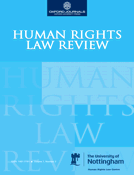A journal editor who was sued in France for criminal libel because of a negative book review has won his case, he told The Chronicle today. Joseph H.H. Weiler, a professor of law at New York University, said that a French court had ruled against the complaint brought against him by Karin N. Calvo-Goller, a scholar in Israel. Ms. Calvo-Goller took issue with a critical review of one of her books on the Global Law Books Web site, which Mr. Weiler edits.
Category: criminal libel
Blasphemy from ancient Greece to modern Ireland
 Earlier this week, I had the great good fortune to attend an enjoyable lecture presented by the, Long Room Hub, Trinity College Dublin. It was
Earlier this week, I had the great good fortune to attend an enjoyable lecture presented by the, Long Room Hub, Trinity College Dublin. It was
Blasphemy: Historical anachronism or modern crime?
by Professor David Nash, Department of History, Oxford Brookes University, UK. He is the author of Blasphemy in Modern Britain 1789-present (Ashgate Publishing, 1999 | Amazon) and Blasphemy in the Christian World (Oxford University Press, 2007 hbk; 2010 pbk | Amazon | cover left). His talk was in three parts: the historical context; the unhappy fit with current models and theories of human development; and the implications of taking blasphemy seriously again.
First, he used the historical context to illustrate the various reasons for longevity and adaptability of concepts of blasphemy. In ancient Greece, blasphemy consisted of speaking ill of the gods and of disturbing the peace. In early Christian dogma after the Council of Nicea in AD 325, it served to reinforce the virtues of orthodoxy. Medieval Christian Europe saw blasphemy as an element of heresy, but in the 13th century, blasphemy becomes decoupled from heresy, and it evolves into what Nash charaterised as the ‘passive blasphemy’ model, where the definition and enforcement of blasphemy is a matter for the State, seeking to eradicate states of mind and opinion that are dangerous to the community.…
Birthday Times
 |
The above image is the front page of the first ever Times newspaper, first published as the Universal Daily Register on 1 January 1785. From today’s Times Online:
…The Times celebrates its 225th birthday
How a former bankrupt with a big idea started a feeble rumbling that became The Thunderer
On this day 225 years ago the very first issue of a newspaper that would soon be renamed The Times appeared on the streets of London. … its beginnings were, to put it mildly, inauspicious … Yet the paper did survive, and prosper, thanks in part to the energy and vision of its creator, John Walter, a former coal merchant, entrepreneur and Lloyd’s underwriter who had declared himself bankrupt after he was ruined by a combination of the American War of Independence and a Jamaican hurricane. …
In 1789 he was put on trial for libelling the Duke of Clarence and the Duke of Cumberland. He refused to reveal his sources, and was sentenced to a year in Newgate Prison, fined £50 and ordered to stand in the pillory at Charing Cross for an hour. This last part of the sentence was lifted, although editors of The Times have occasionally been pilloried since.
The last Irish case on criminal libel
 Yesterday’s Irish Times reminds me of an interesting High Court judgment handed down early in the Summer. It’s called Dennehy v Independent Star Ltd trading as The Irish Daily Star Newspaper [2009] IEHC 458 (28 May 2009) and it concerns an attempt to bring a prosecution for criminal libel. Section 8 of the Defamation Act, 1961 (also here) provides
Yesterday’s Irish Times reminds me of an interesting High Court judgment handed down early in the Summer. It’s called Dennehy v Independent Star Ltd trading as The Irish Daily Star Newspaper [2009] IEHC 458 (28 May 2009) and it concerns an attempt to bring a prosecution for criminal libel. Section 8 of the Defamation Act, 1961 (also here) provides
No criminal prosecution shall be commenced against any proprietor, publisher, editor or any person responsible for the publication of a newspaper for any libel published therein without the order of a Judge of the High Court sitting in camera being first had and obtained, and every application for such order shall be made on notice to the person accused, who shall have an opportunity of being heard against the application.
When the Defamation Act, 2009 (pdf) comes into effect in the new year, section 4 will repeal the 1961 Act and section 35 will abolish the common law crime of criminal or defamatory libel (the UK is soon to follow this lead). So, the Dennehy is likely to be last Irish case concerning this ancient crime. But the case also looks to the future, as one of the arguments made on behalf of the applicants was founded upon the European Convention of Human Rights, and the reasons why that argument failed are quite striking.…
FoE in the EHRLR
 The current issue of the European Human Rights Law Review ([2009] 3 EHRLR | table of contents (pdf) | hat tip ECHR blog) contains a wonderful piece by my colleague Dr Ewa Komorek entitled “Is Media Pluralism a Human Right? The European Court of Human Rights, the Council of Europe and the Issue of Media Pluralism” [2009] 3 EHRLR 395.
The current issue of the European Human Rights Law Review ([2009] 3 EHRLR | table of contents (pdf) | hat tip ECHR blog) contains a wonderful piece by my colleague Dr Ewa Komorek entitled “Is Media Pluralism a Human Right? The European Court of Human Rights, the Council of Europe and the Issue of Media Pluralism” [2009] 3 EHRLR 395.
Here is the abstract (with added links):
…The need for pluralist media stopped being purely a national concern a long time ago and thus it has for decades been subject to scrutiny by the Council of Europe and the European Court of Human Rights. Media pluralism has always come to their agenda as a prerequisite for freedom of expression guarded by Article 10 of the European Convention of Human Rights. It is important to distinguish the two ‘faces’ of media pluralism: internal (which may also be called content pluralism or diversity) and external (or structural). This article focuses on television broadcasting and argues that while the Court of Human Rights has essentially been successful in safeguarding internal pluralism, the protection of structural pluralism proved more difficult to achieve by means of the Court’s case law. This prompted the Council of Europe to step in and attempt to fill the gap with regulatory proposals.
Blasphemy provisions clash with Constitution
 In today’s Irish Times, a piece by yours truly under the above headline:
In today’s Irish Times, a piece by yours truly under the above headline:
Blasphemy provisions clash with Constitution
The President has very few unconstrained powers, and the Council of State is convened only rarely, but this evening they will all move centre stage, when the Council convenes to advise the President whether to refer two controversial Bills to the Supreme Court. Whatever she does about the Criminal Justice (Amendment) Bill, 2009, she should certainly refer the blasphemy provisions of the Defamation Bill, 2006 …
Read all about it here (it’s a development of my argument here).
The cases I mention in the piece are:
Is Lady Chatterley’s Lover obscene?
 No, at least so far as the law is concerned. But after its initial publication in 1928, it was not until the 1960s that litigation in the US and the UK allowed it to become generally available. An op-ed by Fred Kaplan in the today’s New York Times, entitled The Day Obscenity Became Art, (with added links) tells us that
No, at least so far as the law is concerned. But after its initial publication in 1928, it was not until the 1960s that litigation in the US and the UK allowed it to become generally available. An op-ed by Fred Kaplan in the today’s New York Times, entitled The Day Obscenity Became Art, (with added links) tells us that
…today is the 50th anniversary of the court ruling that overturned America’s obscenity laws, setting off an explosion of free speech — … The historic case began on May 15, 1959, when Barney Rosset, the publisher of Grove Press, sued the Post Office for confiscating copies of the uncensored version of D. H. Lawrence’s 1928 novel “Lady Chatterley’s Lover,” which had long been banned for its graphic sex scenes.
… Mr. Rosset hired a lawyer named Charles Rembar, … [who] presented “Lady Chatterley” as a novel of ideas that inveighed against sex without love, the mechanization of industrial life and morbid hypocrisy. … On July 21, 1959, Judge Bryan ruled in favor of Grove Press and ordered the Post Office to lift all restrictions on sending copies of “Lady Chatterley’s Lover” through the mail.
Another twist in the tale of the Defamation Bill
 The saga of the Defamation Bill, 2006 is not over yet. Article 26 of Bunreacht na hÉireann (the Irish Constitution) allows the President, after consultation with Council of State, to refer a Bill to the Supreme Court for a determination of its constitutionality. President McAleese has chosen to convene the Council of State to advise her on the qustion of whether to refer not only the (controversial) Criminal Justice (Amendment) Bill, 2009 (an unsurprising move) but also the (equally controversial) blasphemy elements of the Defamation Bill, 2006 (which has come as a great surprise). (See Belfast Telegraph | BreakingNews.ie | Bock the Robber | ICCL | Irish Emigrant | Irish Independent | RTÉ news | Irish Times | PA | Slugger O’Toole. Update (18 July 2009): see also Irish Examiner | Irish Times here and here | Irish Independent | MediaWatchWatch).
The saga of the Defamation Bill, 2006 is not over yet. Article 26 of Bunreacht na hÉireann (the Irish Constitution) allows the President, after consultation with Council of State, to refer a Bill to the Supreme Court for a determination of its constitutionality. President McAleese has chosen to convene the Council of State to advise her on the qustion of whether to refer not only the (controversial) Criminal Justice (Amendment) Bill, 2009 (an unsurprising move) but also the (equally controversial) blasphemy elements of the Defamation Bill, 2006 (which has come as a great surprise). (See Belfast Telegraph | BreakingNews.ie | Bock the Robber | ICCL | Irish Emigrant | Irish Independent | RTÉ news | Irish Times | PA | Slugger O’Toole. Update (18 July 2009): see also Irish Examiner | Irish Times here and here | Irish Independent | MediaWatchWatch).
There have been 15 such references to date. If the Court holds that a Bill is unconstitutional, the President must decline to sign it; whilst if the Court decides a Bill is constitutional, the President must sign it into law, and the resulting Act is immune from constitutional challenge in the future.…
© cearta.ie 2024. Powered by WordPress